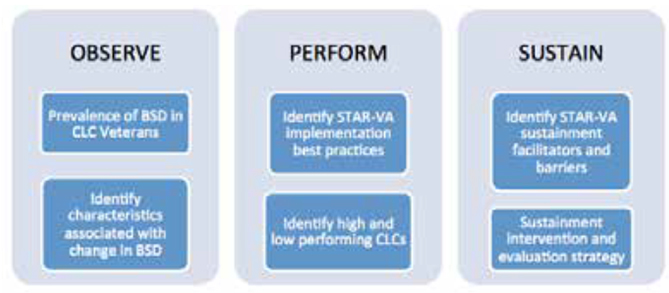
February 2020
QUERI Evaluates STAR-VA: A Veteran-Centered Intervention for Management of DementiaBetween 2013 and 2018, STAR-VA was implemented in 92 VA Community Living Centers (CLCs). Veterans enrolled in STAR-VA demonstrate significant decreases in frequency and severity of targeted challenging BSD and clinical measures of depression, anxiety, and overall agitation. CLC staff also report increased confidence in their ability to understand and manage BSD. Takeaway: STAR-VA implementation helps lower the risks related to the management of the behavioral symptoms of dementia among Veterans living in VA Community Living Centers by decreasing potentially inappropriate medication use and staff injuries. The Staff Training in Assisted Living Residences (STAR) intervention was originally developed for training direct care workers in assisted living residences to improve the care of older adults with dementia by successfully managing the challenging behaviors commonly exhibited by these residents. VA adapted this intervention (called STAR-VA) to be a Veteran-centered, interdisciplinary, behavioral approach for managing the behavioral symptoms of dementia (BSD) among Veterans in VA Community Living Centers. The QUERI Sustaining STAR-VA Partnered Evaluation of Veteran, Implementation and Facility Factors Contributing to Positive Sustained Outcomes was created to:
A distress behavior indicator (DBI) was developed from mandatory routine CLC resident assessments to aid in this evaluation. This indicator was found to be internally consistent, significantly correlated with validated STAR-VA clinical outcome measures as predicted, and sensitive to change. 
Evaluation Findings The longitudinal effect of STAR-VA implementation was compared for site and Veteran outcomes at trained and untrained CLCs. Findings show:
Facilitators and Barriers Important facilitators included the engagement of STAR-VA champions, leaders, and the entire clinical team, routines that foster open communication, and information sharing tools. The most frequent barriers were staffing issues, unsupportive work culture, poor collaboration between disciplines, lack of written policies/procedures, and the need to integrate with performance evaluations. Important facilitators included the engagement of STAR-VA champions, leaders, and the entire clinical team, routines that foster open communication, and information sharing tools. Summary and Recommendations STAR-VA implementation helps lower the risks related to the management of the behavioral symptoms of dementia among Veterans living in VA Community Living Centers by decreasing potentially inappropriate medication use and staff injuries. Thus, this evaluation supports continued STAR-VA implementation. Recommendations include ensuring accurate, complete, and frequent BSD assessment and feedback, the presence of local champions, effective team interactions, routine use of communication tools, and a supportive work culture. Findings will guide the development of an outcome-driven, tailored sustainability implementation and evaluation strategy. For more information about STAR-VA QUERI, contact Principal Investigator, Kim Curyto, PhD, at kimberly.curyto@va.gov. |